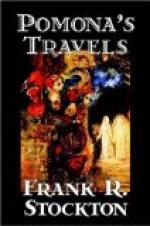I had sense enough not to quote the next two lines, because when I had read them to Jone he said that it was a shame to use a horse that way.
We now came to Loch Achray, at the other end of which is the Trossachs, where we stopped for the night, and when the driver told me the mountain we saw before us was Ben-Venue, I repeated the lines:
“’The hunter marked
that mountain high,
The lone lake’s
western boundary,
And deem’d
the stag must turn to bay,
Where that huge
rampart barr’d the way.’”
At last we reached the Trossachs Hotel, which stands near the wild ravines filled with bristling woods where the stag was lost, with the lovely lake in front and Ben-Venue towering up on the other side. I was so excited I could scarcely eat, and no wonder, because for the greater part of the day I had breathed nothing but the spirit of Scott’s poetry. I forgot to say that from the time we left Callander until we got to the hotel the rain poured down steadily, but that didn’t make any difference to me. A human being soaked with the “Lady of the Lake” is rain-proof.
Letter Number Twenty-four
EDINBURGH
I was sorry to stop my last letter right in the middle of the “Lady of the Lake” country, but I couldn’t get it all in, and the fact is, I can’t get all I want to say in any kind of a letter. The things I have seen and want to write about are crowded together like the Scottish mountains.
On the day after we got to Trossachs Hotel, and I don’t know any place I would rather spend weeks at than there, Jone and I walked through the “darksome glen” where the stag,
“Soon lost to hound
and hunter’s ken,
In the deep Trossachs’
wildest nook
His solitary refuge
took.”
And then we came out on the far-famed Loch Katrine. There was a little steamboat there to take passengers to the other end, where a coach was waiting, but it wasn’t time for that to start, and we wandered on the banks of that song-gilded piece of water. It didn’t lie before us like “one burnished sheet of living gold,” as it appeared to James Fitz-James but my soul could supply the sunset if I chose. There, too, was the island of the fair Ellen, and beneath our very feet was the “silver strand” to which she rowed her shallop. I am sorry to say there isn’t so much of the silver strand as there used to be, because, in this world, as I have read, and as I have seen, the spirit of realistics is always crowding and trampling on the toes of the romantics, and the people of Glasgow have actually laid water-pipes from their town to this lovely lake, and now they turn the faucets in their back kitchens and out spouts the tide which kissed
“With whispering sound
and slow
The beach of pebbles
bright as snow.”
This wouldn’t have been so bad, because the lake has enough and to spare of its limpid wave; but in order to make their water-works the Glasgow people built a dam, and that has raised the lake a good deal higher, so that it overflows ever so much of the silver strand. But I can pick out the real from a scene like that as I can pick out and throw away the seeds of an orange, and gazing o’er that enchanted scene I felt like the Knight of Snowdoun himself, when he first beheld the lake and said:




